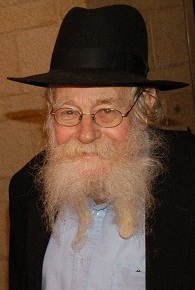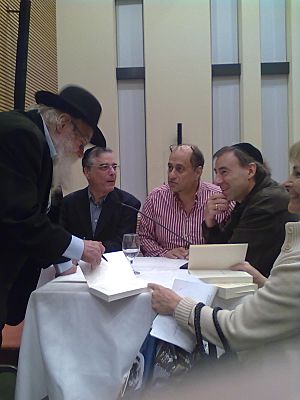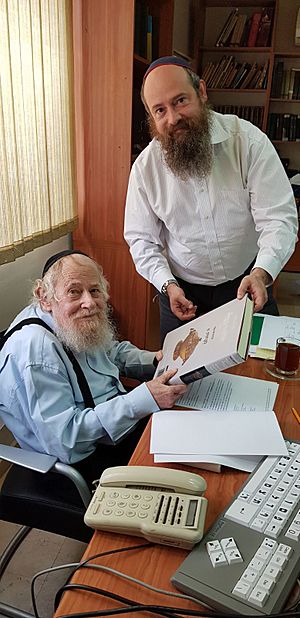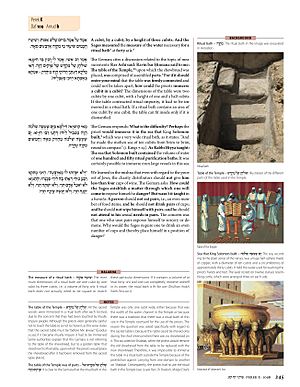Adin Steinsaltz facts for kids
Quick facts for kids
Adin Even-Israel Steinsaltz
|
|
|---|---|
| עדין אבן-ישראל שטיינזלץ | |

Steinsaltz in 2010
|
|
| Born |
Adin Steinsaltz
11 July 1937 |
| Died | 7 August 2020 (aged 83) Jerusalem, Israel
|
| Resting place | Har HaZeitim |
| Nationality | Israeli |
| Alma mater | Hebrew University of Jerusalem |
| Occupation | Rabbi, author |
|
Notable work
|
The Talmud: The Steinsaltz Edition |
| Spouse(s) | Sarah |
| Children | Menachem, Amechaye, Esther Sheleg |
Rabbi Adin Even-Israel Steinsaltz (11 July 1937 – 7 August 2020) (Hebrew: עדין אבן-ישראל שטיינזלץ) was an Israeli Chabad Chasidic rabbi, teacher, philosopher, social critic, author, translator and publisher.
His Steinsaltz edition of the Talmud was originally published in modern Hebrew, with a running commentary to facilitate learning, and has also been translated into English, French, Russian, and Spanish. Beginning in 1989, Steinsaltz published several tractates in Hebrew and English of the Babylonian (Bavli) Talmud in an English-Hebrew edition. The first volume of a new English-Hebrew edition, the Koren Talmud Bavli, was released in May 2012, and has since been brought to completion.
Steinsaltz was a recipient of the Israel Prize for Jewish Studies (1988), the President's Medal (2012), and the Yakir Yerushalayim prize (2017).
Steinsaltz died in Jerusalem on 7 August 2020, from acute pneumonia.
Biography
Adin Steinsaltz was born in Jerusalem on 11 July 1937 to Avraham Steinsaltz and Leah (née Krokovitz). His father was a great-grandson of the first Slonimer Rebbe, Avrohom Weinberg, and was a student of Hillel Zeitlin. Avraham and Leah Steinsaltz met through Zeitlin. They immigrated to Mandatory Palestine in 1924. Avraham Steinsaltz, a devoted communist and member of Lehi, went to Spain in 1936 to fight with the International Brigades in the Spanish Civil War. Adin was born the following year.
Steinsaltz became a baal teshuva during his teenage years and learned from Rabbi Shmuel Elazar Heilprin (Rosh yeshiva of Yeshivas Toras Emes Chabad). He studied mathematics, physics, and chemistry at the Hebrew University, in addition to rabbinical studies at Yeshivas Tomchei Temimim in Lod and with Rabbis Dov Ber Eliezrov and Shmaryahu Noach Sasonkin. Following graduation, he established several experimental schools after an unsuccessful attempt to start a neo-Hassidic community in the Negev desert, and, at the age of 24, became Israel's youngest school principal.
In 1965, he founded the Israel Institute for Talmudic Publications and began his monumental work on the Talmud, including translation into Hebrew, English, Russian, and various other languages. The Steinsaltz editions of the Talmud include translation from the original Aramaic and a comprehensive commentary. Steinsaltz completed his Hebrew edition of the entire Babylonian Talmud in November 2010, at which time Koren Publishers Jerusalem became the publisher of all of his works, including the Talmud. While not without criticism (such as by Jacob Neusner, 1998), the Steinsaltz edition is widely used throughout Israel, the United States, and the world.
Steinsaltz's classic work on Kabbalah, The Thirteen Petalled Rose, was first published in 1980, and now appears in eight languages. In all, Steinsaltz authored some 60 books and hundreds of articles on subjects including Talmud, Jewish mysticism, Jewish philosophy, sociology, historical biography, and philosophy. Many of these works have been translated into English by his close personal friend, now deceased, Yehuda Hanegbi. His memoir-biography on the Lubavitcher Rebbe, Rabbi Menachem Mendel Schneerson, was published by Maggid Books (2014).
Continuing his work as a teacher and spiritual mentor, Steinsaltz joined the original faculty of the nondenominational Pardes Institute of Jewish Studies in Jerusalem in 1972, along with David Hartman, Eliezer Schweid, Menachem Froman, Dov Berkovits, and others. He established Yeshivat Mekor Chaim alongside Rabbis Menachem Froman and Shagar in 1984 and Yeshivat Tekoa in 1999. He also served as president of the Shefa Middle and High Schools. He has served as scholar in residence at the Woodrow Wilson International Center for Scholars in Washington, D.C., and the Institute for Advanced Study in Princeton. His honorary degrees include doctorates from Yeshiva University, Ben Gurion University of the Negev, Bar Ilan University, Brandeis University, and Florida International University. Steinsaltz was also Rosh Yeshiva of Yeshivat Hesder Tekoa.
Being a follower of Rabbi Menachem Mendel Schneerson of Chabad-Lubavitch, he went to help Jews in the Soviet Union assisting Chabad's shluchim (propagators) network. In 1995, the chief Rabbi of Russia, Adolph Shayevich gave Steinzaltz the title of Duchovny Ravin (Spiritual Rabbi), a historic Russian title which indicated that he was the spiritual mentor of Russian Jewry. In this capacity, Steinsaltz travelled to Russia and the Republics once each month from his home in Jerusalem. During his time in the former Soviet Union, he founded the Jewish University, both in Moscow and Saint Petersburg. The Jewish University is the first degree-granting institution of Jewish studies in the former Soviet Union. In 1991, on Schneersohn's advice, he changed his family name from Steinsaltz to Even-Israel. Besides Chabad, Steinsaltz was also inspired by the teachings of the Kotzker Rebbe. He was in close contact with the fifth Gerrer Rebbe, Yisroel Alter, and his brother and successor, Simcha Bunim Alter.
Steinsaltz took a cautious approach to interfaith dialogues. During a visit of a delegation of Roman Catholic cardinals in Manhattan in January 2004, he said that, "You do not have to raise over-expectations of a meeting, as it doesn't signify in itself a breakthrough; however, the opportunity for cardinals and rabbis to speak face to face is valuable. It's part of a process in which we can talk to each other in a friendly way", and called for "a theological dialogue that asks the tough questions, such as whether Catholicism allows for Jews to enter eternal paradise".
Steinsaltz and his wife lived in Jerusalem until his death and had three children and many grandchildren and great-grandchildren. In 2016, Steinsaltz suffered a stroke, leaving him unable to speak. His son, Rabbi Menachem ("Meni") Even-Israel, is the executive director of the Steinsaltz Center, Rabbi Steinsaltz's umbrella organization, located in the Nachlaot neighborhood of Jerusalem.
Steinsaltz died in Jerusalem on 7 August 2020, from acute pneumonia, at the Shaare Tzedek Medical Center. He was hospitalized earlier in the week with a severe lung infection. He leaves behind his wife Sarah, three children and eighteen grandchildren.
Head of the new Sanhedrin
Steinsaltz accepted the position as Nasi (President) of the 2004 attempt to revive the Sanhedrin. In 2008, he resigned from this position due to differences of opinion.
As an author
Steinsaltz was a prolific author and commentator, having written numerous books on Jewish knowledge, tradition and culture, and produced original commentaries on the entirety of Jewish canon: Tanakh (Torah, Prophets, and Writings), the Babylonian Talmud, the Mishna, the Mishneh Torah, and Tanya.
His published works include:
- Biblical Images (1984)
- The Candle of God (1998)
- A Dear Son to Me (2011)
- The Essential Talmud (1976)
- A Guide to Jewish Prayer (2000)
- The Passover Haggadah (1983)
- In the Beginning (1992)
- My Rebbe (2014)
- The Tales of Rabbi Nachman of Bratslav (1993)
- On Being Free (1995)
- The Miracle of the Seventh Day (2003)
- Simple Words (1999)
- The Strife of the Spirit (1988)
- A Reference Guide to The Talmud (2012)
- Talmudic Images (1997)
- Learning from the Tanya (2005)
- Opening the Tanya (2003)
- Understanding the Tanya (2007)
- Teshuvah (1982)
- The Longer Shorter Way (1988)
- The Seven Lights: On the Major Jewish Festivals (2000)
- The Sustaining Utterance (1989)
- The Thirteen Petalled Rose (1980)
- We Jews (2005)
- The Woman of Valor (1994)
As a speaker
Steinsaltz was invited to speak at the Aspen Institute for Humanistic Studies at Yale University in 1979.
Prior to his stroke, he gave evening seminars in Jerusalem, which, according to Newsweek, usually lasted until 2:00 in the morning and attracted prominent politicians, such as the former Prime Minister Levi Eshkol and former Finance Minister Pinchas Sapir.
See also
 In Spanish: Adin Steinsaltz para niños
In Spanish: Adin Steinsaltz para niños




